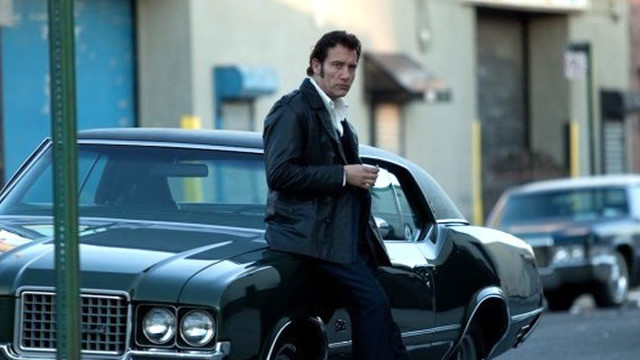
Blood Ties
Director: Guillaume Canet
Year: 2013
Country: USA/France
![]() There are several things you can safely expect from your average ’70s-set American film: flare pants, facial hair, a suitable colour range of beiges and browns, and a heavy debt of influence to the ‘New Hollywood’ films of that era. Blood Ties, a cop/crime-drama set in New York, 1974, and starring Clive Owen and Billy Crudup, does not disappoint on any of the above counts.
There are several things you can safely expect from your average ’70s-set American film: flare pants, facial hair, a suitable colour range of beiges and browns, and a heavy debt of influence to the ‘New Hollywood’ films of that era. Blood Ties, a cop/crime-drama set in New York, 1974, and starring Clive Owen and Billy Crudup, does not disappoint on any of the above counts.
Owen and Crudup play brothers, Chris and Frank Pierzynski, who (if you hear a whirring sound that’s the cliché alarm) have grown up on opposite sides of the law. Frank is now a highly respected NYPD official; Chris, a criminal just out of jail unable to stay on the straight and narrow for very long. Orbiting around these two central characters are a host of talented actresses in supporting roles, including Marion Cotillard, Mila Kunis, Zoe Saldana, and Lily Taylor, all playing either shunned ex-wives or long-suffering relatives/girlfriends. Cue lots of family melodrama, all stemming from the main tension between the two brothers with directly conflicting interests.
Sadly, Blood Ties fails to find a balance between plot and mood, and lacks rhythm in its juggling of various characters and subplots, leaving us none too interested in any of them. A fine cast on paper is underused, or downright wasted, in a script (co-written between director Guillaume Canet and James Gray) which only veers from the banal in a handful of scenes.
Another thorn in this film’s side is the dodgy NYC accents performed (attempted, one should say) by some of the multi-national cast; the main culprits being Owen, Kunis, and Cotillard. Never underestimate how much a bad accent can undercut the performance of even the best of actors. Though, to his credit, Matthias Schoenaerts pulls off what must be the finest New York drawl by a Belgian actor in movie history (even more impressive given English is his third language).
Linguistic issues aside, what does come across loud and clear in Blood Ties is how director Canet (as an actor you may recognise him from The Beach, as director from his French-language breakthrough Tell No One) and co-writer Gray (more habitually a director and whose We Own the Night is too obviously a better version of this film’s narrative blueprint) are both haunted by the legacy of 1970s American cinema.
There’s a sweep of obligatory nods, including the presence of ’70s Hollywood icon James Caan (as Chris and Frank’s father, the film’s best male performance), a strategically positioned Chinatown poster, or a finale in a train station — which could be a reference to any of half-a-dozen Brian De Palma pictures.
A finale which, by the way, serves little purpose other than homage. It may attempt to make us care about Chris’ (Clive Owen’s) narrative arc, but fails for two reasons:
- Chris is a character who, at the midpoint of the film, we saw murder an unarmed young man for no reason other than his being at the wrong place at the wrong time; a murder which is not even referred to again in the rest of the movie. Why should we simultaneously emotionally invest our feelings into this character while agreeing to completely throw away all feelings about that boy he killed?
- The family melodrama and sub-plots involving ex-wives and girlfriends have made us largely lose all momentum in our interest for Chris as a character anyway. By the time the finale does come, the film has already been flat-lining too long to be resuscitated.
There’s nothing wrong with treading familiar ground, but in the process a movie should also be adding new little twists of its own to the old formulas. That’s how great genre films are made. Blood Ties never manages this and never even comes close. Finally, we have to ask, why watch a lifeless wannabe when the originals remain infinitely superior? You’re better off tracking down a copy of Serpico or The French Connection instead.

